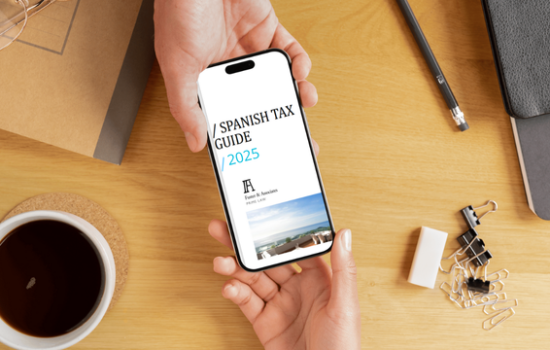
Si usted es un extranjero que está considerando comprar una propiedad o invertir en España, es importante comprender los aspectos fiscales básicos que pueden afectar sus finanzas.
Además, debe determinar si se le considerará residente fiscal o no residente, ya que esto influirá en sus obligaciones fiscales. Aquí te explicamos los conceptos más relevantes:
Residencia fiscal en España: ¿Eres residente o no residente?
La residencia fiscal es un factor importante para cualquier extranjero que viva o invierta en España, ya que determina qué impuestos debe pagar y sobre qué ingresos.
Criterios para ser considerado residente fiscal en España
Se le considera residente fiscal en España si cumple alguno de los siguientes criterios:
1. Permanecer en España más de 183 días en un año natural (del 1º de enero al 31 de diciembre)
- Estos días no tienen por qué ser consecutivos.
- Las ausencias esporádicas pueden contarse como días en España si no se puede acreditar la residencia fiscal en otro país.
2. Tener a España como base principal de tus actividades económicas
- Si su principal fuente de ingresos proviene de España (por ejemplo, trabaja o posee un negocio aquí), puede ser considerado residente fiscal.
3. Tener tus intereses vitales centrados en España
- Si su cónyuge e hijos menores residen en España, la Agencia Tributaria española puede considerarlo residente fiscal a menos que se demuestre lo contrario.
Ejemplo práctico: ¿Eres residente fiscal en España?
Ejemplo 1: John, un ciudadano británico con una casa en Alicante (residente fiscal en España)
John compró una propiedad en Alicante por más de 500.000 € y tiene una Golden Visa. En 2024:
• Llega a España el 1 de febrero y se queda hasta el 30 de noviembre.
• Pasa 10 meses en España (más de 183 días en el año natural).
• Aunque mantiene cuentas bancarias e ingresos en el Reino Unido, España lo considera residente fiscal.
Consecuencias para Juan:



Ejemplo 2: Lisa, una ciudadana holandesa con una casa de vacaciones en Los Alcázares (no residente fiscal en España)
Lisa vive en Ámsterdam y pasa los veranos en su apartamento en Murcia. En 2024:
• She arrives in Spain on June 1st and stays until September 15th (less than 183 days).
• Her business and primary residence are in the Netherlands.
• She has no spouse or children living in Spain.
Consequences for Lisa:




These examples show how tax residency does not depend on nationality or visa type but rather on time spent in the country and other factors.
Key Tax Concepts Affecting Foreigners in Spain
1. Foreigner Identification Number (NIE)
- The NIE is a personal identification number assigned to foreigners in Spain for administrative purposes.
- It is required for any financial or legal transaction in Spain, such as purchasing property or opening a bank account.
- It should not be confused with the TIE (Foreigner Identity Card), which is a physical document that certifies legal residency.
2. Transfer Tax (ITP)
- Paid when purchasing a second-hand property.
- Varía según la región y se calcula como un porcentaje del precio de compra de la propiedad (entre el 6% y el 10%)
3. IVA en la compra de propiedades nuevas
- Si se compra directamente a un promotor, se aplica un 10% de IVA sobre el precio de compra.
- Además, el Impuesto de Actos Jurídicos Documentados (AJD) debe pagarse en las propiedades de nueva construcción. Este impuesto varía según la región y generalmente oscila entre el 0,5% y el 2% del precio de compra.
4. Impuesto sobre bienes inmuebles (IBI)
- Se paga anualmente al gobierno local y varía según el valor catastral de la propiedad.
- El impuesto se calcula aplicando un porcentaje a este valor, que oscila entre el 0,4% y el 1,3%, dependiendo del municipio.
Ejemplo: Para una propiedad en Los Alcázares con un precio de compra de 200.000 €, el valor catastral suele ser inferior, por ejemplo, 120.000 €. Si el tipo aplicable es del 0,75%, el IBI anual sería de 900 €.
5. Impuesto sobre la Renta de No Residentes (IRNR)
- Si no es residente y posee una propiedad en España, debe pagar este impuesto anualmente, incluso si no la alquila.
- El impuesto se calcula aplicando un porcentaje fijo al valor catastral del inmueble, que varía en función de si se ha revisado el valor catastral del inmueble en los últimos diez años.
- En general, el tipo oscila entre el 1,1% y el 2%, con un tipo impositivo del 19% para los residentes de la UE y del 24% para los no residentes de la UE.
Ejemplo: Para una propiedad en Alicante con un precio de compra de 200.000 €, el valor catastral puede ser inferior, por ejemplo, 120.000 €. Si el coeficiente aplicable es del 1,1%, la base imponible sería de 1.320 €. Si el propietario es residente de la UE, pagaría el 19% de esa cantidad, un total de 251 €. Si no es residente en la UE, la tasa del 24% resultaría en un pago de 317 €.
Distinguir entre la condición de residente fiscal y no residente es esencial para comprender sus obligaciones fiscales en España. Conocer los impuestos más relevantes te ayudará a planificar y evitar problemas legales.
Si está considerando invertir en España o cambiar de residencia, es importante comprender las implicaciones fiscales. Solicita nuestro informe fiscal, y te explicaremos detalladamente cómo afectará a tus finanzas.
Queremos ayudarle a navegar por todas las complejidades legales que conlleva la compra o venta de una casa en España, pero este artículo es información legal y no debe verse como asesoramiento legal.





